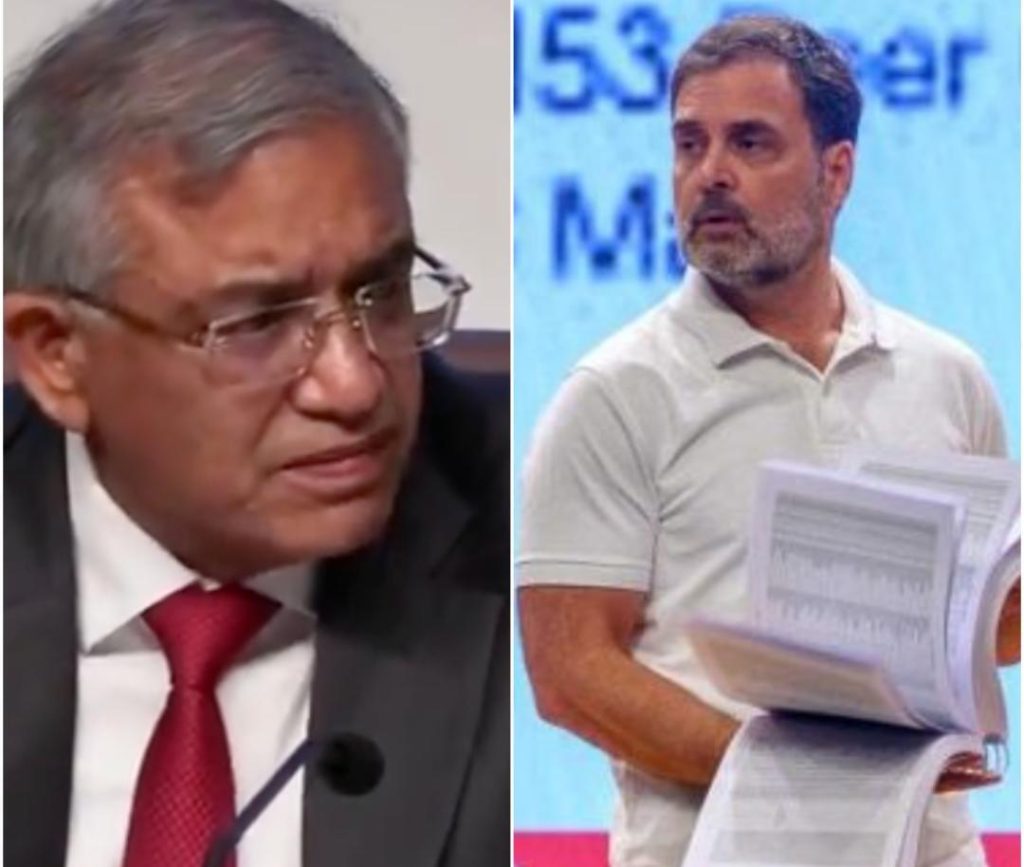
Vote Chori’ Phrase an Insult; Should We Share CCTV Footage of Mothers & Sisters Voting?: EC
The ongoing general elections in India have been marred by controversies and debates, with political leaders from various parties making sensational claims about the electoral process. One such phrase that has gained attention is “vote chori” or “stealing votes,” which is being used by Congress leader Rahul Gandhi to claim that elections are rigged. However, Chief Election Commissioner (CEC) Gyanesh Kumar has come down heavily on this phrase, labeling it an insult to the Constitution.
In a recent statement, Kumar criticized Rahul Gandhi’s use of the term “vote chori,” saying that it is an insult to the Constitution and the democratic process. He emphasized that the Election Commission (EC) is committed to ensuring free and fair elections, and any attempts to undermine the credibility of the electoral process are unacceptable.
The CEC’s statement has sparked a fresh debate about the role of surveillance footage in polling booths. With the increasing use of technology in the electoral process, many have been demanding that the EC release CCTV footage of polling booths to ensure transparency and prevent any malpractices. However, Kumar has raised concerns about the privacy of voters, particularly women, saying that sharing CCTV footage could compromise their privacy.
“Should the Election Commission share the CCTV videos of any voter, including their mothers, daughters-in-law?” Kumar asked, emphasizing that the EC is committed to protecting the privacy of voters.
The demand for releasing surveillance footage has been gaining momentum, particularly among social media users who believe that it is essential to ensure transparency in the electoral process. However, Kumar’s statement has raised concerns about the unintended consequences of releasing such footage.
Firstly, releasing CCTV footage could compromise the privacy of voters, particularly women who may be captured on camera while casting their votes. In a country where women’s privacy is often compromised, releasing such footage could be a violation of their fundamental rights.
Secondly, releasing CCTV footage could create a culture of surveillance, where voters feel that they are being watched and monitored at all times. This could have a chilling effect on the electoral process, as voters may feel reluctant to exercise their franchise freely.
Thirdly, releasing CCTV footage could create a false sense of security, where voters believe that the EC is monitoring every move they make. This could undermine the trust in the electoral process, as voters may feel that the EC is not independent and impartial.
In addition to these concerns, releasing CCTV footage could also create logistical challenges for the EC. With thousands of polling booths across the country, releasing footage from each booth could be a daunting task, requiring significant resources and manpower.
Given these concerns, it is essential to strike a balance between ensuring transparency in the electoral process and protecting the privacy of voters. The EC could consider releasing aggregated data or statistical analysis of polling booth footage, rather than individual footage of voters.
In conclusion, while the demand for releasing CCTV footage of polling booths is understandable, it is essential to consider the unintended consequences of such a move. The CEC’s statement has raised important questions about the role of surveillance footage in the electoral process, and it is essential to strike a balance between ensuring transparency and protecting the privacy of voters.
As we move forward in these elections, it is essential to remain vigilant and ensure that the electoral process is free and fair. However, it is also essential to respect the privacy of voters and ensure that their rights are protected.






